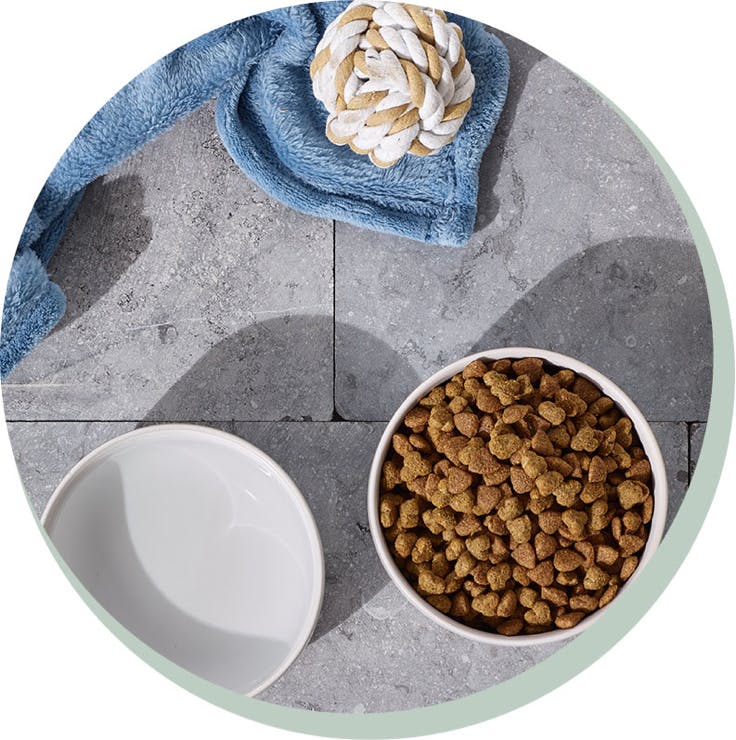Dog food for sensitive stomachs
100% tailored to support their comfort
Prebiotics for a healthy gut

Omega-3 for skin and coat care

Antioxidants to support the immune system


Dog food that’s easier to digest
We take care of your dog's digestion with a unique recipe of dry food that we expertly balance with helpful prebiotics - and the right kinds of fibre - to help sensitive stomachs.
The ingredients we include to support your dog
Gut health
We use ingredients like beet pulp and FOS (Fructo-oligosaccharides) to help nourish the natural bacteria in your dog’s gut and make nutrients easier to absorb.
Immune system
We include ingredients like vitamins A, E, zinc, selenium and a yeast extract called MOS (Mannan-oligosaccharides). These help your dog’s immune defences in the gut.
*Your dog’s tailored kibble blend is created in a factory that handles a wide range of kibbles, so there may be trace amounts of other ingredients present.
FAQs
Every dog is different when it comes to their digestion. What works wonders for one pup might not suit another, even if they're quite similar. A lot depends on your dog's individual gut health and how well they handle certain ingredients. If you're not sure what your dog might be sensitive to, a good place to start is to consider a fixed-ingredient recipe. This means the ingredients stay consistent. If a food label says something vague like "cereals" or "meat" without specifying the type, the recipe can actually change with seasonal availability. For a sensitive dog, these shifts can lead to an upset tummy. If that doesn’t help, your next step would be to check the fat content of your dog’s food. If your pup is currently on a high-fat diet, a lower-fat option might be gentler on their system. You could also consider a hypoallergenic diet. These formulas are designed to avoid some of the most common food allergens, like beef, wheat or dairy. A diet that includes prebiotics or probiotics can also help their digestion by supporting a healthy microbiome. The good news is, at Tails.com, we’ve helped thousands of dogs with sensitive stomachs. We can create a personalised meal plan for their needs, including intolerances and digestion support. So you know they’re getting the support they need in every bowl.
When it comes to sensitive stomachs, some dogs might thrive on wet food, as its higher moisture content can have a soothing effect. For other pups, dry food could be the perfect fit. What’s more important is the specific ingredients and nutrient levels - like protein, fat, and fibre - in their food. Every dog is unique, and finding the right balance through a little trial and error is key.
A grain-free food will only be better for a dog with a sensitive stomach if the cause of the sensitivity is a grain intolerance or allergy. Many other factors can lead to digestive upset, such as overfeeding, stress, a diet too high in fat, or even the wrong amount or type of fibre. Sometimes, poor-quality ingredients can be the culprit too. If you're unsure why your dog has a sensitive stomach, don't worry! Our friendly nutrition specialists in our customer service team are here to help. They can offer expert guidance to get your pup feeling their best.
Prebiotics are fantastic for your dog's gut health. They're special plant fibres, like those found in chicory root or yeast, that act as fuel for the good bacteria in your dog's tummy, helping to keep their digestion running smoothly. You'll find prebiotics in both wet and dry dog foods, often listed as FOS, MOS, or Inulin. While many pet food brands only add prebiotics to their "sensitive" or digestive-support formulas, we believe every dog deserves to feel great from the inside out. That's why all Tails.com kibble blends naturally contain prebiotics to support a healthy digestive system.
Any dog breed, and even mixed breeds, can experience a sensitive stomach. Sometimes, it's a passing issue like an infection, parasites, stress or a reaction to a new food or medication. However, some breeds are simply more prone to specific digestive problems. For instance, English Springer Spaniels can be susceptible to pancreatitis, while German Shepherds often have a higher risk of inflammatory bowel disease. Deep-chested dogs like the Great Dane may struggle with bloat, and flat-faced (brachycephalic) breeds can sometimes have digestive issues linked to their breathing difficulties.
Get 60% off your first box + 30% off your second